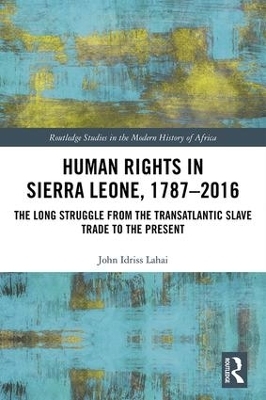
Human Rights in Sierra Leone, 1787-2016
Routledge (Verlag)
978-1-138-60476-6 (ISBN)
This book offers an up-to-date, comprehensive interdisciplinary analysis of the multifaceted and evolving experiences of human rights in Sierra Leone between the years 1787 and 2016. It provides a balanced coverage of the local and international conditions that frame the socio-cultural, political, and economic context of human rights: its rise and fall, and concerns for the broader engendered issues of the transatlantic slave trade, colonialism, women’s struggle for recognition, constitutional development, political independence, war, and transitional justice (as well as "contributive justice," which the author introduces to explain the consequences of the problems of the temporal nature of transitional justice, and the crisis of donor fatigue towards peacebuilding activities), local government, democracy, and constitutional reforms within Sierra Leone. While acknowledging the profound challenges associated with the promotion of human rights in an environment of uncertainty, political fragility, lawlessness, and deprivation, John Idriss Lahai sheds light on the often-constructive engagement of the people of Sierra Leone with a variety of societal conditions, adverse or otherwise, to influence constitutional change, the emergent post-coflict discourse on "contributive justice," and acceptable human rights practice.
This book will be of interest to scholars in West African history, legal history, African studies, peace and conflict studies, human rights and transitional justice.
John Idriss Lahai is a Research Fellow at the University of New England, Australia.
Foreword; Introduction; 1. The Transatlantic Slave Trade and the Illusions of "Freedom," 1787–1790; 2. The Restitutive Justice Policy of the Sierra Leone Company, 1791–1808; 3. No Taxation without Representation, 1820–1920; 4. Citizens and Protected Persons, 1920–1951; 5. Racism and the Rise of Party Politics, 1950–1960; 6. Class Conflict: Chiefs, Politicians, and Peasants and the Revolts of 1955 and 1956; 7. Women in the Colonial Spaces: From the Founding of the Colony to 1960; 8. Political Independence and the Africanization Project, 1960–1967; 9. The Narratives on Human Rights in a Neopatrimonial State, 1967–1984; 10. Ethnopolitics, Tribal-Nationalism, and the Youth Empowerment Crisis, 1985–1991; 11. (Wo)Men’s Rights in the Neopatrimonial/Ethnopolitical Spaces, 1967–1991; 12. The Idea of Liberation in the War Communities, 1991–2002: Representation, Adaptation, and Outcomes; 13. Contested Truth: The Truth Commission and Restorative Justice, 2002–2004; 14. The War Victims’ Fund and the Emergence of Contributive Justice after 2004; 15. The Quest for Another Province of Freedom: The Human Rights Commission and the Constitutional Review Committee, 1994–2016; 16. Conclusion
| Erscheinungsdatum | 02.10.2018 |
|---|---|
| Reihe/Serie | Routledge Studies in the Modern History of Africa |
| Zusatzinfo | 1 Tables, black and white; 1 Line drawings, black and white; 1 Illustrations, black and white |
| Verlagsort | London |
| Sprache | englisch |
| Maße | 156 x 234 mm |
| Gewicht | 672 g |
| Themenwelt | Geisteswissenschaften ► Geschichte ► Regional- / Ländergeschichte |
| Naturwissenschaften ► Geowissenschaften ► Geografie / Kartografie | |
| Recht / Steuern ► Allgemeines / Lexika | |
| Recht / Steuern ► EU / Internationales Recht | |
| Recht / Steuern ► Öffentliches Recht ► Völkerrecht | |
| Sozialwissenschaften ► Soziologie ► Spezielle Soziologien | |
| ISBN-10 | 1-138-60476-3 / 1138604763 |
| ISBN-13 | 978-1-138-60476-6 / 9781138604766 |
| Zustand | Neuware |
| Informationen gemäß Produktsicherheitsverordnung (GPSR) | |
| Haben Sie eine Frage zum Produkt? |
aus dem Bereich


